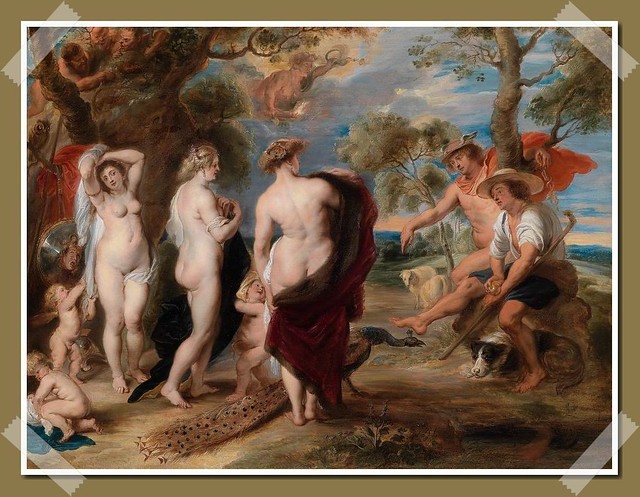Judgment of Paris

Judgment of Paris In Greek mythology, one of the principal myths regarding the origin of the Trojan War. The Judgment involved Paris in a dispute among the goddesses Hera, Athena, and Aphrodite. When Eris, goddess of discord, was not invited to the wedding banquet of Peleus and Thetis, she threw a golden apple marked, “for the fairest” into the gathering. Hera, Athena, and Aphrodite all competed for the apple, and each asked Zeus to award her the prize. To avoid making the choice, Zeus told the three goddesses to go to Mount Ida, where a handsome youth, Paris, was tending sheep. They were to ask him to make the judgment. (Paris had become a shepherd because his father, King Priam of Troy, had been warned that the lad would bring disaster upon Troy.) Each of the three goddesses sought Paris’s favour. Hera offered him power, Athena offered wisdom, and Aphrodite promised him the most beautiful woman in the world, Helen. He chose Helen, and Aphrodite sent Paris to Sparta, where he seduced Helen, wife of King Menelaus, and fled with her to Troy. Menelaus followed with a host of Greeks under the command of Agamemnon, Menelaus’s brother, and the Trojan War began. The myth has been frequently retold and painted. The Judgment of Paris is either retold or cited in Vergil’s Aeneid (book 1); Ovid’s Heroides, which gives an elaborate description; Lucian, who made the apple golden and magic; the medieval retelling, The Tale of Troy; and Tennyson’s Dream of Four Women and Oenone. The subject was painted by, among others, Cranach, Rubens, Watteau, Renoir, and Dali.
SOURCE:
Encyclopedia of World Mythology and Legend, Third Edition – Written by Anthony S. Mercatante & James R. Dow
Copyright © 2009 by Anthony S. Mercatante